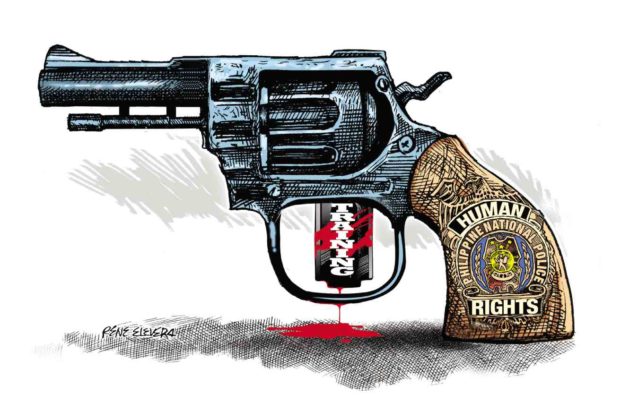No place for rights violations in a professional police force

ILLUSTRATION BY RENE ELEVERA
Human rights usually means bad news to police, who equate the word with charges slapped against them. It doesn’t help that President Duterte has repeatedly denounced the Commission on Human Rights (CHR) and other groups that point out the country’s lapses in this field.
It’s a negative view that the Philippine National Police Human Rights Affairs Office (PNP-HRAO) has been working to correct through a series of training and seminars on human rights.
“(Police officers) perceive human rights negatively because they think they will be charged immediately for the slightest mistake (they make in dealing with civilians),” said Supt. Joel Usman, who heads the PNP-HRAO’s Promotion and External Affairs Division.
“They also have this notion that we conduct training and seminars on the subject only in areas where there are lots of human rights violations,” he added.
But the training is just a reminder of the police’s duty to respect the rights of people, Usman said.
Article continues after this advertisement“We tell them that if they remain competent and professional and strictly adhere to police operational procedures, they do not have to worry about being slapped with charges. We remind them to conduct operations by the book in enforcing laws, which are aimed at protecting our citizens’ rights,” the HRAO official said.
Article continues after this advertisementUsman further explained that the PNP-HRAO trainings and seminars were just like the values education subject in high school, which serves to “enhance the values of policemen in their work, in themselves and towards others.”
The trainings, he said, are more on lectures and case analyses where they teach policemen the right approach in interacting with citizens so the public perception of PNP personnel is positive and not wary.
“We basically teach them to take things step by step and avoid shortcuts (in implementing laws) so that they will not violate human rights,” Usman explained.
According to PNP-HRAO spokesperson Melvin Ragasa, the PNP personnel take away from the trainings a broader awareness of human rights and a sense that their primordial duty is to protect the rights of all citizens.
He pointed out, “The PNP leadership believes that human rights is the first business of policing.”
Usman said that the PNP-HRAO’s target was to train all 180,000 PNP personnel nationwide in human rights protection, which entails a continuous effort and calls for prioritizing areas where there are numerous reports on violations.
But he pointed out that the trainings conducted by the PNP-HRAO were more like refresher courses for police personnel who were already given human rights modules upon their recruitment.
With only a handful of personnel at the PNP-HRAO headquarters in Camp Crame, the police leadership has created human rights desks in all police offices at the regional and provincial levels down to the stations.
Ragasa explained that these were their “conduits for the promotion and awareness programs on human rights.” The police regional, provincial and station human rights desks, he said, conduct trainings and seminars and monitor human rights violations committed by policemen in the different areas.
He clarified that while it was also part of the mandate of the PNP-HRAO to monitor human rights violations committed by police personnel, the unit had no power to investigate them.
“The PNP-HRAO function is limited to monitoring investigations, as well as legal and judicial processes related to human rights violations (committed by policemen). We do not have investigative power. Investigative power is vested on other disciplinary mechanisms of the PNP like the IAS (Internal Affairs Service) and the DIDM (Directorate for Investigation and Detective Management),” Ragasa pointed out.
PNP-HRAO monitoring reports are used, he said, for policy recommendations on how to further improve police efforts in protecting and upholding human rights, adding that the provision of body cameras to PNP personnel conducting anti-illegal drug operations was one such suggestion that emanated from the unit.
As part of monitoring efforts, the PNP-HRAO conducts inspections on police custodial facilities nationwide to make sure that persons deprived of liberty, or PDLs, receive humane treatment like clean and well-ventilated cells and are still afforded their rights.
PNP-HRAO was born on June 29, 2007, along with its military counterpart, as part of the government response to recommendations by then UN special rapporteur on extrajudicial, summary or arbitral execution, Philip Alston, who observed impunity on extrajudicial killings in the Philippines following his 2007 visit.
The primary functions of the PNP-HRAO are: to develop a systematic, holistic implementation of human rights programs and activities; review, formulate and recommend human rights policies and programs including administrative and legal measures on human rights; monitor investigations and legal, judicial processes related to human rights violations of PNP personnel; undertake an information campaign on PNP human rights initiatives; and establish links with concerned agencies involved in handling human rights violation cases against PNP personnel such as the CHR, the presidential human rights committee and other government and nongovernment organizations.
PNP-HRAO has begun community-based dialogues between PNP personnel and civil society groups, as well as local government units to facilitate better understanding.
With the war on drugs, the PNP-HRAO has had to work double time to reach more policemen, particularly those involved in anti-illegal drug operations.
“We need to intensify our trainings and reminders to our police personnel because the slightest allegation of abuse is detrimental to the whole institution,” Ragasa said.